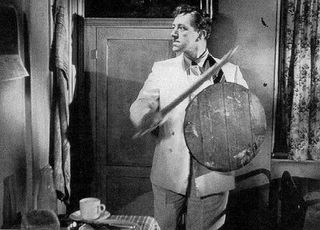The Man in the White Suit
The old British film industry always struck me as kind of charming. There were all these little production houses, like Ealing Studios or Hammer Films, turning out odd little idiosyncratic movies. Hammer's favored genre was horror, and they had a reliable stable of performers and filmmakers working on literally dozens of films within a span of a few years. And over at Ealing, from the early 1940's through the mid 50's, a remarkable amount of well-crafted, socially conscious comedies were produced, many of them created by the same talents.
One of these actors was Alec Guinness.
Of course, everyone in my generation knows Alec Guinness as Obi-Wan Kenobi. I certainly did for the vast majority of my life. In fact, I'll readily admit that, despite terrific performances by the man in a wide variety of films, a part of me always thinks of him in a brown cloak waving his hand around to mesmerize Storm Troopers.
So it's a credit to his wonderful performance in 1951's The Man in the White Suit that I could see him as Sidney Stratton, the mad genius behind a controversial invention.
The Man in the White Suit may be the only comedy ever produced about polymerization. Stratton has thought up a process to create a fabric with almost-magical properties. It's virtually indestructable, and will never wear out. Also, it repels dirt, never requiring cleaning. He's been drifting around for years, following expulsion from Cambridge because of his radical ideas, working at various textile mills in an attempt to conduct his dangerous experiments.
When Sidney finally succeeds, thanks to the help of a greedy industrialist (Cecil Parker), his invention doesn't receive the praise and delight he expected. The owners of various textile mills, who run the entire town in which the film is set, fear that the technology will render their investments obsolete. And the workers among whose ranks Sidney once walked fear that, if no one ever needs new clothes, they'll all be out of jobs.
And they're right. What's so remarkable about Man in the White Suit is that we're expected to side with a protagonist whose too self-centered to consider the ramifications of his deeds. I'm not saying that it would be correct to deny the world Sidney's invention, but he seems to chase his dreams not because of some duty to the world, but for his own glory.
Also, the invention itself raises deeper questions. Surely, if Sidney had invented a process that could create something vital to the world's interest, it's morally reprehensible to keep the thing bottled up for profits. But what about Sidney's space-age suit, a suit that glows in the dark and repels dirt, is vital to the world's concerns. It's an intentionally muddled case, an invention that's useful that would likewise cripple a major industrial sector vital to the British economy.
And like all great British comedy, the film considers these weighty issues only as subtext, lightening the mood with clever wordplay and slapstick hijinks. Like the great Monty Python sketches and films that would follow a generation later, Ealing comedies demonstrated a mastery of combining the high and lowbrow. Here is a movie taking on issues of class, technology and labor right alongside pratfalls, comic explosions and puns. It's a dizzying combination, and while the movie is rarely laugh-out-loud funny, it is always amusing and very entertaining.
Much of this derives from the wonderful supporting cast of characters. There's Joan Greenwood as the daughter of a capitalist with Sidney's best interests at heart. She's got a lot of presence on screen, but her voice doesn't seem to match her body at all. It's kind of weird, almost like her part was dubbed (although I'm quite certain it was not). Also, comic book movie fans will recognize Alfred from the Batman movies, Michael Gough, as another textile mill owner seeking to keep a lid of Sidney's innovation.
The various farcical hijinks that end the film all come off fairly well, if as I said, they never amount to anything like hilarity. It also ends on an intriguing down note. Without giving too much away, Sidney's invention never reaches the mainstream and the status quo of the textile industry remains. I couldn't quite make out the film's eventual take on Sidney. He remains an enigma as Guinness plays him, obsessive about cloth in an almost psychotic way, so self-assured that he never once really doubts the need to expose his invention to the world.
He has been someone who has been rejected by society. Kicked out of school, banned from every textile mill where he's worked, unable to get funding or support for his successful scientific innovations. Even when he makes friends during the film, like Greenwood's society woman or Vida Hope as a blue collar mill worker, they are quick to turn on him when they don't like his ideas.
Guinness plays the character with a good deal of petulance, and something of an attitude. He has come to feel better than the commoners and simpletons with whom he's forced to mix, and if the world could only see the great things he has done, they would finally give him the respect he deserves. It's a fairly brave choice, so when the movie leaves Sidney's fate uncertain, there's a creepiness to the ambiguity. Sure, it's a happy ending, because the hero walks off into the sunset, but he's a man who controls a very valuable secret that could do considerable damage if released. And he seems more than a bit unstable.

No comments:
Post a Comment